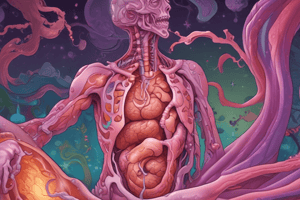Podcast
Questions and Answers
What is a common symptom of Ulcerative Colitis?
What is a common symptom of Ulcerative Colitis?
- Bloody diarrhea (correct)
- Hairy leukoplakia
- Weight gain
- Abdominal swelling
Which extra-intestinal manifestation is associated with Ulcerative Colitis?
Which extra-intestinal manifestation is associated with Ulcerative Colitis?
- Diabetes mellitus
- Erythema nodosum (correct)
- Pneumonia
- Rheumatoid arthritis
Where is Crohn’s disease primarily characterized by chronic inflammation?
Where is Crohn’s disease primarily characterized by chronic inflammation?
- In any part of the gastrointestinal tract (correct)
- Only in the small intestine
- Predominantly in the esophagus
- Only in the colon
What is a common oral manifestation of Ulcerative Colitis?
What is a common oral manifestation of Ulcerative Colitis?
Which laboratory finding is typically elevated in patients with Ulcerative Colitis?
Which laboratory finding is typically elevated in patients with Ulcerative Colitis?
Which of the following oral manifestations is NOT associated with Crohn disease?
Which of the following oral manifestations is NOT associated with Crohn disease?
What palliative treatment is commonly recommended for symptomatic oral lesions in patients with inflammatory bowel disease?
What palliative treatment is commonly recommended for symptomatic oral lesions in patients with inflammatory bowel disease?
Which of the following is a potential cause of gastritis?
Which of the following is a potential cause of gastritis?
Which statement about the dental management of inflammatory bowel disease is true?
Which statement about the dental management of inflammatory bowel disease is true?
Which of the following conditions is NOT listed under the etiology of gastritis?
Which of the following conditions is NOT listed under the etiology of gastritis?
Flashcards are hidden until you start studying
Study Notes
Gastrointestinal Diseases Overview
- Common gastrointestinal tract (GIT) diseases include Crohn’s disease, ulcerative colitis, and gastro-oesophageal reflux disease (GERD).
- Understanding signs, symptoms, pathogenesis, management, and how these conditions relate to dental practice is essential.
Inflammatory Bowel Diseases (IBD)
- IBD is characterized by chronic mucosal inflammation, primarily affecting the colon and rectum in ulcerative colitis.
- Symptoms of ulcerative colitis include bloody diarrhea, abdominal pain, and fecal urgency.
- Laboratory tests often reveal elevated inflammatory markers (ESR, CRP) and fecal calprotectin levels.
Oral Manifestations of Ulcerative Colitis
- Major and minor aphthous ulcers commonly appear on buccal mucosa.
- Pyostomatitis vegetans presents as purulent inflammation primarily on buccal and labial mucosa.
- Hairy leukoplakia may occur, associated with HIV.
Crohn's Disease
- Crohn’s disease can occur anywhere in the gastrointestinal tract, unlike ulcerative colitis.
- Extra-intestinal manifestations may affect eyes, joints, mouth, and skin.
Oral Manifestations of Crohn's Disease
- Persistent linear and deep ulcers, cobblestone mucosal architecture, and indurated swelling of the lips.
Dental Management of IBD
- Routine dental care helps in monitoring oral health.
- Oral lesions may be diagnosed and managed with topical steroids and sodium bicarbonate rinses.
- Dexamethasone elixir can be used for extensive lesions.
Gastritis
- Gastritis involves inflammation of the gastric mucosa, commonly linked to H. pylori infection and NSAIDs use.
- Classified into acute, chronic, atrophic, and erosive gastritis.
Definitions
- Acute Gastritis: Neutrophilic infiltration of the gastric mucosa.
- Chronic Gastritis: Mononuclear infiltrate with loss of normal tissue architecture.
- Atrophic Gastritis: Chronic inflammation leading to gland loss, often replaced by fibrosis.
- Erosive Gastritis: Superficial erosions causing potential bleeding.
Peptic Ulcer Disease
- Characterized by ulceration due to factors like H. pylori infection, drug-induced conditions, and mucosal pallor.
Gastroesophageal Reflux Disease (GERD)
- GERD involves regurgitation of stomach contents into the esophagus, causing symptoms like heartburn and potential esophageal injury.
Risk Factors for GERD
- Include smoking, caffeine and alcohol consumption, stress, obesity, pregnancy, scleroderma, sliding hiatal hernia, and asthma.
Red Flag Symptoms
- Dysphagia, anemia, unintentional weight loss, and evidence of GI bleeding indicate potential complications needing referral for EGD.
Oral Manifestations of GERD
- May include dysgeusia, erosion, mucosal erythema, xerostomia, and esophageal stricture.
Dental Management of GERD
- Sodium bicarbonate mouth rinses can mitigate dysgeusia.
- Topical fluoride applications support mineralization.
- Maintain sufficient hydration and consider salivary substitutes.
Malabsorption Disorders
- Pernicious Anemia: Often from Vitamin B12 deficiency due to gastric mucosa atrophy, leading to macrocytic normochromic anemia.
- Diagnosis involves serum Vitamin B12 and methylmalonic acid levels.
- Oral manifestations include an inflamed "beefy red" tongue, glossitis, glossodynia, and burning mouth.
Folic Acid Deficiency Anemia
- A macrocytic anemia resulting from a lack of dietary folic acid, particularly in diets low in leafy vegetables.
Studying That Suits You
Use AI to generate personalized quizzes and flashcards to suit your learning preferences.




